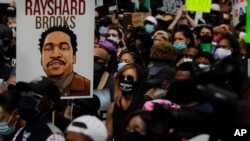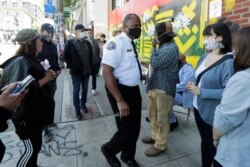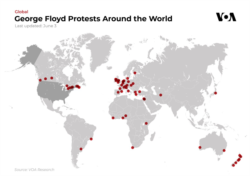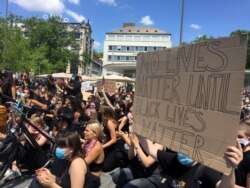Demonstrators calling for a stop to police brutality are marching in Atlanta Monday, days after police fatally shot Rayshard Brooks in the city and three weeks after the death in police custody of George Floyd in Minnesota.
The Atlanta protests, organized by civil rights groups, including the NAACP, gathered outside the Capitol where lawmakers were returning to work after a coronavirus shutdown. More than a thousand demonstrators demanded lawmakers take up criminal justice reform, as well as voting issues, after last week’s election was marred by long lines at the polls.
A few protesters came inside the Capitol, chanting in the building’s rotunda.
Several Democratic state lawmakers, who are in the minority in the Georgia House and Senate, joined the protest Monday and said they are ready to act on calls for reforms. Republican House Speaker David Ralston told lawmakers Monday he wants to pass a bill to further penalize hate crimes, saying its passage is “just as important” as passing a state budget. The House has previously passed a hate crimes bill, but it has stalled in the Senate.
Many Democrats are proposing an array of new legislation to reform policing practices, however Republicans, as well as some Democrats, say there is not enough time to pass a big legislative package with only 11 days remaining in the lawmakers’ session following a lengthy coronavirus shutdown.
Demonstrations also took place Monday evening in Lafayette Park across the street from the White House to mark two weeks since law enforcement forcefully cleared a peaceful crowd shortly before U.S. President Donald Trump walked through the area for a photo opportunity at a nearby church.
Also Monday, the U.N. Human Rights Council agreed to hold an urgent debate on Wednesday “on the current racially inspired human rights violations, systematic racism, police brutality and violence against peaceful protesters.”
Sunday brought protests in many cities, including Washington, New York, Los Angeles, Atlanta and Miami.
Seattle situation
Seattle Police Chief Carmen Best said Sunday on the CBS network’s “Face the Nation” that she hopes officers can move back into a section of the city taken over by peaceful protesters without resorting to “something that devolves into a force situation.”
Protesters have peacefully occupied a four-block part of the city which they have named “Capitol Hill Autonomous Zone.” Organizers say they want a neighborhood without police. A huge “Black Lives Matter” mural covers the area’s main thoroughfare.
Trump has called the occupiers “ugly anarchists” and said the city should “take back” the zone.
Speaking to reporters at the White House Monday, Trump said, “the American public is very angered” by what is happening in Seattle and said the media is not covering the situation enough.
He said that if “the right ever took over a city, conservative Republicans took over a city, it would be the biggest story in history.”
Seattle Mayor Jenny Durkan last week likened the zone to “a block party atmosphere” and no threat to the public. She said the zone will be restored to the city at some time.
European protests
Anti-racism marches inspired by Floyd's death continued all weekend in some large European cities.
Demonstrators in Berlin formed a 9-kilometer-long chain that began at the Brandenburg Gate.
In Paris, the police protested what they say were unfair accusations of racism and brutality.
Shortly after 15,000 people demonstrated in the French capital, about 50 officers and their police cars surrounded the Arc de Triomphe.
British Prime Minister Boris Johnson said Monday he would create a commission to look at what more can be done to fight racial inequality in Britain.
Johnson said Sunday “racist thuggery” has no place in British streets after right-wing extremists attacked protesters against racism. About 100 people were arrested.
London Mayor Sadiq Khan blamed the violence solely on the right-wingers and thanked police for doing a “fantastic job” in restoring order.
Also Sunday, hundreds marched through Tokyo, holding banners reading “Black Lives Matter.”
Thousands also demonstrated Sunday in New Zealand and took a knee for a moment of silence for Floyd in front of the U.S. consulate.



